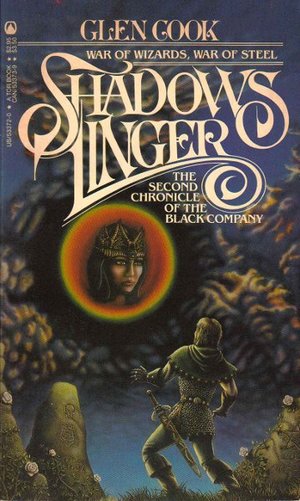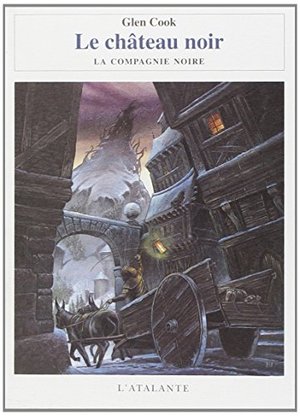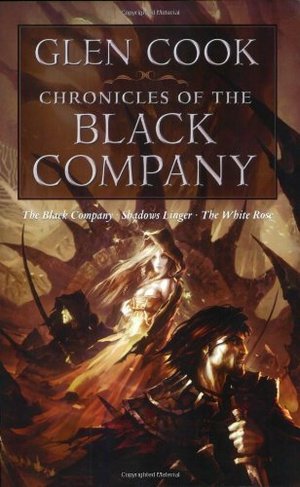Into the Grimness: Shadows Linger by Glen Cook
 Let me start off with a warning: there will be spoilers galore in this and all future Black Company posts. There’s just no way to avoid them at this point. So if you haven’t read the books, do us all a favor and read them.
Let me start off with a warning: there will be spoilers galore in this and all future Black Company posts. There’s just no way to avoid them at this point. So if you haven’t read the books, do us all a favor and read them.
Shadows Linger (1984) amps up the proto-grimness of Cook’s seminal epic fantasy series, at the same time taking much of the focus away from the titular Black Company and the previous book’s narrator, Croaker. It’s a surprising approach when so much of the initial book’s story was about the company itself as an almost living thing, complete with its own complicated history and traditions. It works though, due to Cook’s jaundiced view of human nature, and skill at crafting a harsh, noir atmosphere and setting.
At the end of The Black Company, ex-nobleman and all-around badass Raven realized that Darling, the nine year-old girl the Company rescued, was the White Rose. It was prophesied that the White Rose, who in centuries past had defeated and imprisoned the Dominator and the Lady, would be reincarnated when the need for her again arose. Now is that time.
Shadows Linger begins nine years after the close of The Black Company. The Company has become the Lady’s fire brigade, marching back and forth across her vast empire, forever extinguishing any signs of rebellion. Resistance leaders are hunted down and killed and the peace of iron-fisted repression is enforced. Still, the Company holds on to a sliver of its members’ humanity.
The Lady’s service has not been bad. Though we get the toughest missions, we never have to do the dirty stuff. The regulars get those jobs. Preemptive strikes sometimes, sure. The occasional massacre. But all in the line of business. Militarily necessary. We’d never gotten involved in atrocities. The Captain wouldn’t permit that.
The Dominator, the Lady’s husband and once the the North’s resident Dark Lord, remains imprisoned in the Barrowlands, held in place by spells, soldiers, and a dragon. Something, though, is stirring and it seems as if he is preparing to somehow escape his bonds. An investigation leads members of the Company and two of the Taken, the Lady’s own ringwraith sort of wizards, to Juniper. Juniper exists in the most remote part of the North on a bay that is free from ice only half the year. There, a strange black castle has been growing year by year. Somehow it is connected to the Barrowlands and the Dominator.
Unbeknownst to anyone in the Company, Raven and Darling have been hiding out in Juniper for several years. And yet the story does not revolve around them. Instead, Cook turns his eye to Marron Shed, the hapless owner of the Iron Lily tavern, deep in debt to a predatory loan shark, and scared of his own shadow. While Raven is renting a room from Shed, and Darling is working for him, he doesn’t know they know each other.
Shed’s story intersects with Raven’s when a customer dies in the tavern. Juniper venerates its dead, enclosing them in vast catacombs with coins to pay their way into the land of the dead. This is the fourth man to die in the Lily in recent months and Shed is worried the Custodians of the Dead will look at him suspiciously. Raven tells him there is something he can do that won’t attract the eye of the Custodians and will make him some much needed money. Eventually it is revealed to Shed that there are beings living in the black castle who will pay good money for a body, the fresher the better. With each body, the castle grows.
Raven drove through the gate, turned right, halted beneath a broad arch. A single lantern battled the darkness clotting the passageway. Raven swung down. Shed followed, his nerves shrieking. They dragged the bodies out of the wagon and swung them onto stone slabs nearby. Then Raven said, “Get back on the wagon. Keep your mouth shut.” The one body stirred. Shed grunted. Raven pinched his leg savagely. “Shut up.”
A shadowy shape appeared. It was tall, thin, clad in loose black pantaloons and a hooded shirt. It examined each body briefly, seemed pleased. It faced Raven. Shed glimpsed a face all of sharp angles and shadows, lustrous, olive, cold, with a pair of softly luminous eyes.
“Thirty. Thirty. Forty. Thirty. Seventy,” it said.
Raven countered, “Thirty. Thirty. Fifty. Thirty. One hundred.”
“Forty. Eighty.” “Forty-five. Ninety.” “Forty. Ninety.” “Done.”
They were dickering! Raven was not interested in quibbling over the old people. The tall being would not advance his offer for the youth. But the dying man was negotiable.
 When Croaker and the rest of the Company’s advance unit land in Juniper, they learn the truth of the black castle. When it grows to a certain size, the creatures inside will be able to free the Dominator, unleashing him on the North once again. The Company is tasked with discovering who is feeding bodies to the castle, and stopping them. Meanwhile the Taken, Feather and Whisper, will begin probing the castle to determine how to destroy it.
When Croaker and the rest of the Company’s advance unit land in Juniper, they learn the truth of the black castle. When it grows to a certain size, the creatures inside will be able to free the Dominator, unleashing him on the North once again. The Company is tasked with discovering who is feeding bodies to the castle, and stopping them. Meanwhile the Taken, Feather and Whisper, will begin probing the castle to determine how to destroy it.
Shed’s story in Shadows Linger is quintessential noir. Fundamentally a foolish and cowardly man, and having gotten himself hopelessly into debt, he quickly succumbs to the temptation of easy money from the guardians of the black castle. Even when he seems to have regained his financial footing, he makes horrible choices and commits an act of utter moral repugnance. Cook details his downward spiral with the cold eye of an accountant, simply laying out his accumulating sins for the reader. Despite his tremendous failings, there’s something to Shed’s desperation and despair that draws the reader (and Croaker) to him. If not completely sympathetic, it’s easy to have some empathy for such a foolish and self-deluding character.
Croaker and the Company’s is more of a detective story, though one with plenty of magical flash and monsters. Their first objective is to discover who is supplying the black castle’s provender. In the course of that investigation, a second one is begun when Raven is spotted. Not only is he protecting Darling, but when he fled the Lady’s empire he took a chest of documents that might contain something that could undo her power: her true name. Quickly, the primary goal becomes finding Raven and keeping him and Darling out of the Lady’s hands.
As the two story lines converge, Cook ratchets up the tension. As Shed feels the noose woven from his greed and stupidity tightening, he finds himself being sucked further and further down into the mire. The Company, pressed between the demands of the Lady and the Taken and their secret effort to grab Raven and Darling, finds itself in danger of being found out as the lies and misdirections pile up. Later installments of the series suffer from dull patches and squiggling little bits that drag things on for far too long. There’s none of that in the The Black Company or Shadows Linger. Cook never lets the pace slacken nor allows the reader to get lost in the chaos. He never forgets he’s writing epic fantasy, and he knows how to pull out all the stops and turn it up to eleven in huge, bloody battles.
By then the castle creatures were mounting a sortie against the trench and wall, directly toward where I stood watching. I recall being more puzzled than fearful.
How many were there? Shed had given the impression the castle was practically untenanted. But a good twenty-five of them, attacking with wizardry backing them, made the trench and wall almost pointless.
They came out the gate. And something came over the castle wall, vast and bladder-like. It hit the ground, bounded twice, mashed down on the trench and palisade, crushing one and filling the other. The sortie streaked for the opening. Those creatures could move.
The Limper came down out of the night, shrieking with the fury of his descent, glowing ever more brightly as he dropped. The glow peeled off in flakes the size of maple seeds, which fluttered in his wake, spinning and twisting earthward, eating into whatever they contacted. Four or five attackers went down.
The Lieutenant launched a hasty counterattack, finished several of the injured, then had to retreat. Several of the creatures dragged fallen soldiers toward the castle. The others came on.
Without a heroic bone in my body, I picked up my heels and headed across the slope. And a wise move that proved.
The air crackled and sparked and opened like a window. Something poured through from somewhere else. The slope froze so cold and so fast the air itself turned to ice. The air around me rushed into the affected area, and it too froze. The cold took most of the castle creatures, enveloping them in frost. A random javelin struck one. The creature shattered, turning to powder and small shards. Men hurled whatever missiles were available, destroying the others.
Shadows Linger is a better-constructed and better-written book than The Black Company. The prose is improved, lacking the jarringly bad sentences that marred some of the previous book. It’s also more properly a novel rather than a strand of connected stories. While it lacks that book’s blaze of originality, it’s the book of the series that I’ve always remembered best. Between the cold and impoverished city of Juniper and its obsession with the dead, the goings on at the black castle, the battle for the castle, and the novel’s final resolution, Cook painted a world that unsettled me in a way I’d never encountered.
 Like in his earlier Dread Empire series, Cook took chances in how he dealt with his characters that I had never seen an author do before. He also created a world teeming with evil, where motivations were murky and selfish most of the time and holding on to an ember of morality and good usually led to one’s death. Along with Croaker, Marron Shed is the most memorable character in the original trilogy. Even when you lose all respect for him, there’s still a part of you that roots for him to pull it off, to survive one more stupid action and find a way out of the morass he’s lowered himself into. Croaker continues to develop, exposing a bit more of his romantic, hopeful side, and assuming a role of authority within the Company, which will become increasingly important. More than any of his other books that I’ve read (thirty and counting), Shadows Linger seems to be a distillation of Cook’s literary worldview. For that reason its character names, events, images, remain fresher over all these years than those from any other of his stories.
Like in his earlier Dread Empire series, Cook took chances in how he dealt with his characters that I had never seen an author do before. He also created a world teeming with evil, where motivations were murky and selfish most of the time and holding on to an ember of morality and good usually led to one’s death. Along with Croaker, Marron Shed is the most memorable character in the original trilogy. Even when you lose all respect for him, there’s still a part of you that roots for him to pull it off, to survive one more stupid action and find a way out of the morass he’s lowered himself into. Croaker continues to develop, exposing a bit more of his romantic, hopeful side, and assuming a role of authority within the Company, which will become increasingly important. More than any of his other books that I’ve read (thirty and counting), Shadows Linger seems to be a distillation of Cook’s literary worldview. For that reason its character names, events, images, remain fresher over all these years than those from any other of his stories.
Moorcock’s Elric and Wagner’s Kane may exist in worlds filled with horrors, but both are tremendously powerful characters able to face off most of the terrors they meet. Croaker and the others are just men, mostly, by this point, middle-aged and tired. Against them are arrayed the might and sorcery of the Lady, surpassed in history only by her trapped husband. Croaker and the rest are soldiers — not heroes, not warriors, but soldiers. What stands between them and things that would destroy them are their brains and a talent for leveraging luck to their advantage. When they’re in danger, when the odds against them start rising, it never feels like Cook’s going to pull a cheat and spring a deus ex machina. No one in Glen Cook books is indestructible, and that’s driven home pretty hard in Shadows Linger.
The Black Company stands as a groundbreaking work of epic fantasy. For its time, especially, it was a challenging work, requiring the reader take a chance on following a company of blackguards as they seemingly did the devil’s work for pay. In Shadows Linger, Cook really starts paying back on that gamble. Again, if you haven’t read this series, take a chance, and do so.
Previous Black Company reviews
Fletcher Vredenburgh reviews here at Black Gate most Tuesday mornings and at his own site, Stuff I Like when his muse hits him. Right now, he’s writing about nothing in particular, but he might be writing about swords & sorcery again any day now.
I very much agree. Of the original trilogy there are various bits I can always call to mind, most of which come from Shadows Linger.
The letters from Corby. Shed charging someone extra for a rope to hang from when sleeping. The list goes on.
I am looking forward to your take on The Silver Spike. Also wonder if John ever got round to reading it..
I’m not sure if anyone’s ever done battlefield magic as well as Cook, although my personal favorite in that regard is Reap the East Wind, one of the later Dread Empire novels.
I’m glad I shifted from my Robert E. Howard-centric posting to the hardboiled PI genre when I did. This Black Company series would have buried any fantasy-related tripe I put up.
GREAT series, Fletcher!
@Tony Den – Cook gets grief for the supposedly faceless nature of his worlds, but I disagree. His stories are filled with loads of details and color.
@Joe H. – I completely agree. For me it’s the battles in Kavelin against the Imperial legions and the savan dalage in October’s Baby
@Bob – Thanks, Bob! After the Black Company and some other things, I’m going to start on the Dread Empire series.
The first book in the series never did it for me. After I kept getting recommendations for the series, I reluctantly picked up the second part. I’ve read the whole series in one go after that.
This was the book where the series clicked for me.
@JimmyS – Thus I am shown to be right! 😉 That’s really very cool. I’ve never read them all in a single run, having read them as they came out, sometimes with excruciatingly long gaps between books. This will be the first time I do that, and I think it’ll give the later books a little better context and keep me from forgetting just what in the wide, wide, world of sports is going on.
I’ve never read the Dread Empire books.
I have, however, read every single Garrett PI book and I wish I could have come up with something like that. Fantasy, hard boiled and Nero Wolfe – with humor. BRILLIANT stuff.
How did they sell any copies with that cover? Really how?
@Barsoomia – I have left the covers alone hoping no one would bring them up. Cook didn’t get any decent covers until the the Black Company books made it to hardcover later in the series. Of all his covers, the Black Company are the least good by a long shot.
Well, it was the 1980s. (RE: The covers.)
I would like to thank you, Your later articles on this series turned me on to these books. I made it about half way through dreams of steel before moving on to something else for a while.
I liked the first trilogy a lot with Shadows Linger being my favorite. The books of the south I wasnt able to get into as much. I thought the series worked better when they were mid level grunts rather than both the chroniclers and the leaders of the Black Company… The first Trilogy had such great ideas though, like the Black Castle and the Elder Tree with the crazy storms, really enjoyed them.
Ive been reading your blog too, love the history stuff!
@Evan – Thank you! I get losing interest in the Books of the South. As to my other blog, thank you for stopping by.